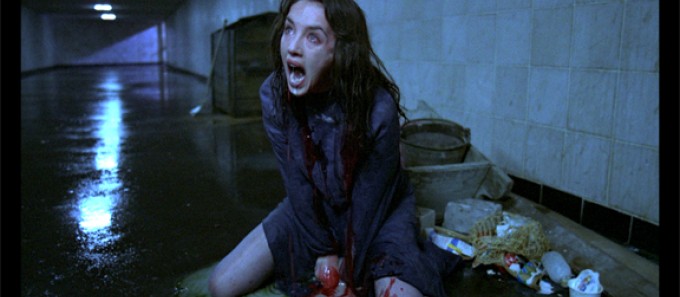- When:
- Friday, March 6, 2015, 7:00pm - 7:00pm
- Description:
-
The redder-than-red blood that drips from Isabelle Adjani's mouth in Andrzej Żuławski's 1981 film Possession represents only a fraction of the excess that this recently-restored horror psychodrama spectacular brings to the screen. In the Village Voice, J. Hoberman writes “The phrase 'over the top' doesn't begin to characterize” the film, while Michael Atkinson summarizes the film as “Petite Guignol plunge into marital fracture.” Made while Żuławski was going through an intense breakup, the film can also be interpreted as a very personal exploration of extreme emotions. Adjani won Best Actress at Cannes Film Festival for her performance, and her intense physicality produces a rich exploration of the limits of the performing body on screen. Possession explores the body as excess, as terror, as passion, and as monster, resulting in a film that is almost unclassifiable, incorporating elements from horror, suspense, exploitation cinema, and more.
(Andrzej Żuławski, 1981, 35 mm, 124 min, courtesy of Bleeding Light Film Group)
Preceded by short films Hand Movie (Yvonne Rainer, 1966) and Pulling Mouth (Bruce Nauman, 1969).
This is the first screening in a 2-part series presented in conjunction with the Department of Cinema and Media Studies 2015 Graduate Student Conference, Performing Bodies: Gesture, Affect, and Embodiment on Screen (April 17-18). “The cinema story starts with the human body,” Leos Carax writes. “We always have, and we still love to watch human bodies in action. We also love to watch landscapes or things we have created, buildings or cigarettes, guns and cars... but above all, we love to watch human bodies, whether they're walking, running, fucking, or anything.” This conference seeks to open up the question “what do bodies do on screen” by situating screen performance in an expanded field of bodily practices and critical discourses.” To what extent can the movements of a body—so manifold, so potentially rich—be adequately described and made intelligible in language, and do new trends in audiovisual forms of media criticism promise to overcome this disparity? As the moving image landscape mutates, in what ways do digital imaging technologies (CGI, motion capture) complicate the notion of the body or challenge its prominence—and in what ways have cinematic bodies always been virtual?
The conference is organized by Matt Hubbell (Ph.D. student, CMS), Noa Merkin (Ph.D. student, CMS), and Nicole Erin Morse (Ph.D. student, CMS), and is co-sponsored by the Department of Cinema and Media Studies, the Center for the Study of Gender and Sexuality, the Council on Advanced Studies, and the Humanities Division Graduate Student Council.
Possession
